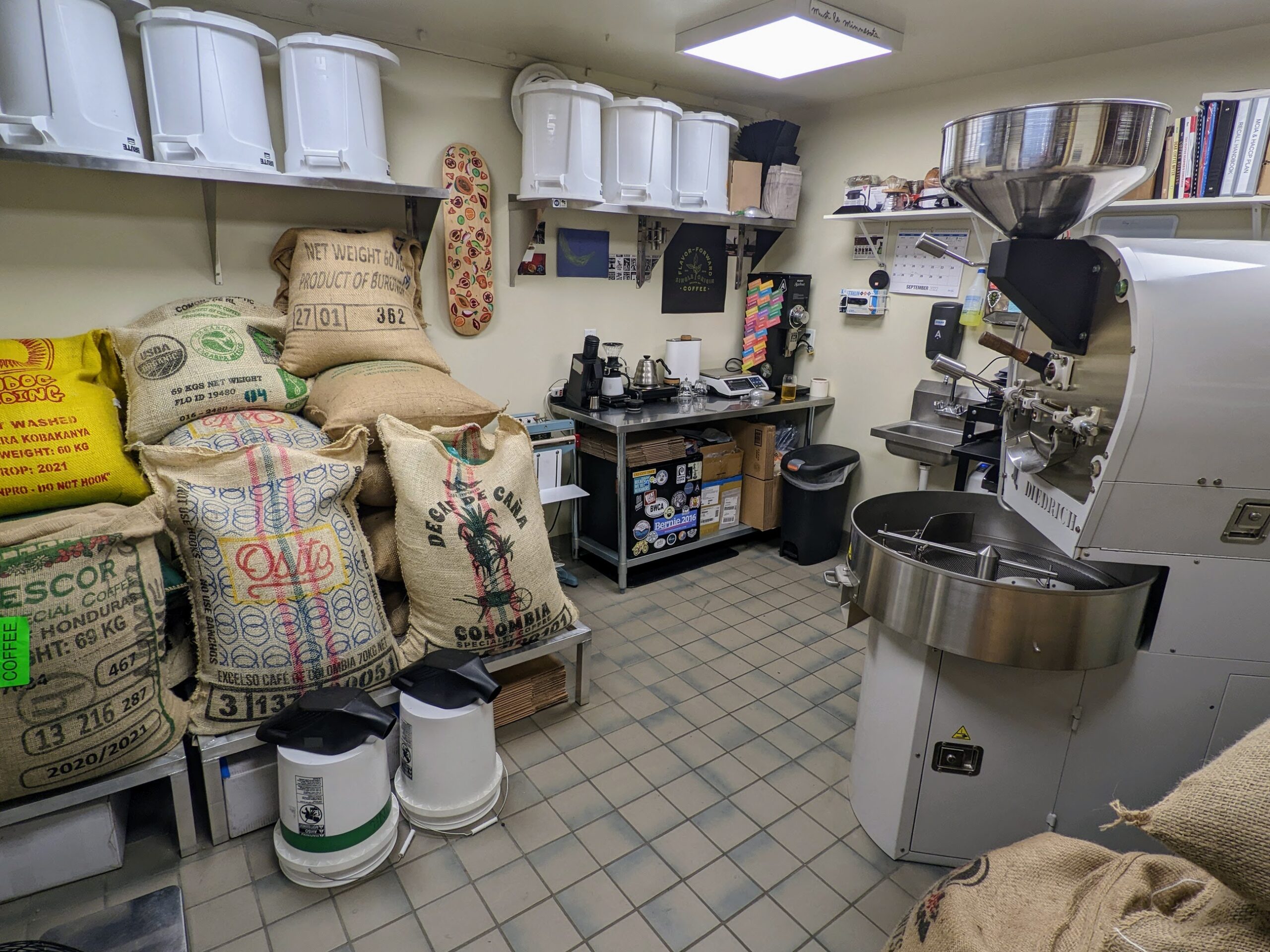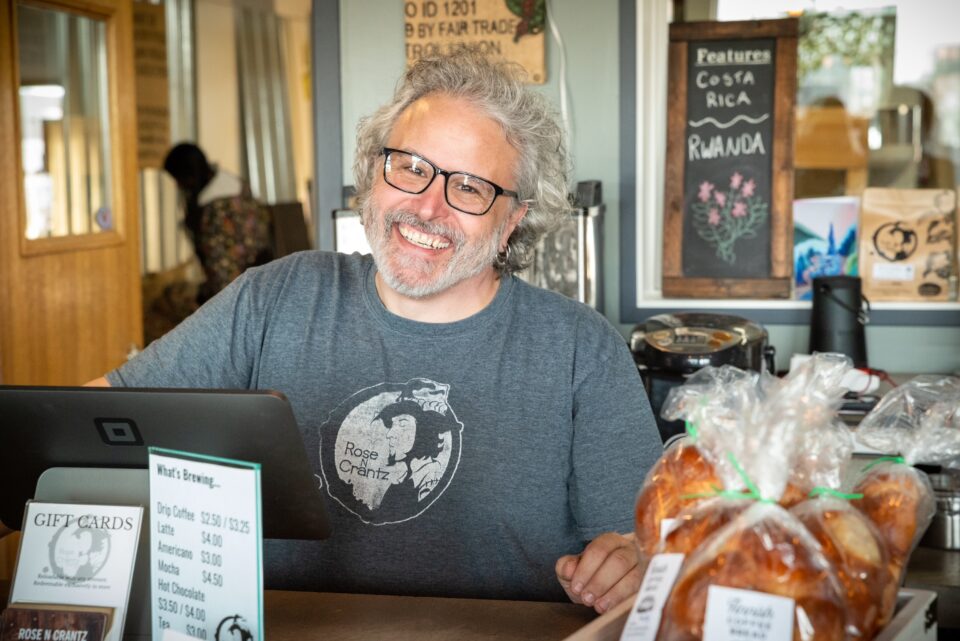North Shore Coffee Roasteries Focus on Traceability, Transparency, and Education
Coffee is an enormous worldwide industry worth billions of dollars. Green coffee beans are harvested in countries throughout the Global South, then roasted and consumed in countries throughout the Global North. Coffee is an everyday product that has become highly commercialized, and our consumption is often driven by gimmicks, marketing, and brand names. People flock to Tim Hortons, or Caribou Coffee, and spend hundreds (thousands?) of dollars a year on specialty coffee drinks. There are also dozens of cool, family-owned cafes throughout the Northern Wilds that serve up coffee with their own signature style. So, given that coffee is a daily routine that grounds and supports so many of us, how much time and effort should we put into doing coffee right? And who decides what right is? Three local coffee roasteries—Almanac Coffee in Duluth, Fika Coffee in Lutsen, and Rose N Crantz Roasting Co. in Thunder Bay—have been humbly working to provide us a local answer to those questions. And they’re not the only ones. Here’s how North Shore roasteries are providing coffee options with a local flare.
Almanac Coffee, Duluth
Justin Wood, owner and operator of Almanac Coffee, based out of the Duluth Folk School, sources coffee beans from faraway places such as Rwanda, Tanzania, and Burundi, in East Africa. Wood knows exactly by who, and how, the beans are grown and has a knack for transferring his knowledge of each farm’s beans into specialty roasts that his customers can enjoy daily, while living seasonally. That’s because Wood is constantly refreshing and changing his coffee offerings, depending on which beans are “in season.” He can tell you which beans are grown by single farmers/families, the differences in processing methods from region to region, the importance of and challenges in maintaining organic certification among small producers, and his personal relationship to the farms and the importers he works with. Does this information make a better product?
“Coffee is a curious thing,” explains Wood. “It’s an agricultural product, so we can trace where it comes from. Especially in what I work in—specialty coffee—there’s a premium that comes from this traceability, our ability to know exactly where the beans are grown, who managed the crop, and how they were handled once harvested.” Wood is quick to point out that while we don’t usually ask where our potatoes come from, coffee can be different, if we want it to be.
Much of coffee’s appeal, Wood suggests, is that it is values-driven. “If you’re a socially conscious person, and you want to ensure the people who grew your coffee are also being taken care of, then you need to look outside conventional commodity markets.”
Wood believes that increased knowledge about a coffee’s origins can influence the quality of the finished product. “We’re at this interesting inflection point where for so long coffee was seen as just a black liquid, a ‘caffeine fix when needed.’ But in fact, coffee is very complex. On a chemical level, there’s a lot going on. These are largely the effects of where the coffee is produced, the weather patterns that occurred that season, soil conditions, etc. Truly these things end up in the cup.”

Wood calls coffee drinking a mindful practice, and points out that coffee is in a way responsible for great ideas, and enlightenment. “Coffee is absolutely about commodity chains, and the quality of the cup, but it’s also about communion, getting together, and advancing ideas,” notes Wood.
Almanac Coffee is always roasted from fresh crop coffee beans, so there are specific harvest windows for when the coffee is produced. Wood’s job is to get the right beans at the right time, and roast them to perfection. “We’re kind of an outpost here in northern Minnesota. We’re talking about tropical agricultural products. That needs to be acknowledged.”
So, what does Wood have to say about his competitors further down Superior St. in Duluth? “Sure, you can pay a premium price for a lesser product at a commercial operation, like Starbucks. I think that people in my position hold that as a completely antithetical concept.”
Wood sells his roasted beans wholesale, and does retail and coffee subscription sales online on Alamanc’s website. To try his handcrafted roasts, visit the Dovetail Café in the Duluth Folk School.
Fika Coffee, Lutsen
Josh Lindstrom has owned and operated Fika Coffee in downtown Lutsen for over 11 years, thereby becoming a fixture of the Highway 61 commute for tourists, cabin owners, and locals alike. Lindstrom sees his coffee shop as serving the “West End” of Cook County. “Lutsen, Tofte, Schroeder—that’s where all the beds are in Cook County,” notes Lindstrom of the many vacation resorts surrounding Fika. “We’re meeting a significant need as a coffee shop.”
But Lindstrom’s business goes much deeper than just making maple lattes with Lutsen-sourced maple syrup. He and his five full-time employees, plus additional summer staff, roast all the beans they sell too. Lindstrom is proud to be providing local jobs while influencing the way business is done locally. “Our vision is to encourage change and challenge the way business affects life on the North Shore.” What does Lindstrom mean? He sees Fika as creating a new paradigm for how work is done, and it starts with valuing personal life, fun, and free time over simply slaving at the roaster or the espresso machine. “If I’m working 70-80 hours a week, that’s not a good thing,” says Lindstrom. “I’m not going to do that. And I don’t want my employees to either.”
Fika Coffee shop is open four days a week, Friday-Monday, from 7 a.m. to 2 p.m. “We could have more business if we stayed open till 4 or 5 p.m.,” says Lindstrom, “but that’s not the best thing for Fika or our employees.”

Still, Lindstrom says someone is actively working all seven days of the week. Tuesdays, Wednesdays and Thursdays are roasting days, where Lindstrom and his staff can roast 3.5 batches an hour. “Roasting a batch of coffee takes 10 minutes for light roast, and anywhere from 10-12 and a half minutes for organic dark roast,” recounts Lindstrom.
And when not roasting or operating the café, Lindstrom is planning his next big steps—expanding to a bigger roasting facility, with staff housing and a public classroom, slated for construction in the Grand Marais Business Park this spring.
Don’t worry—you’ll still see Lindstrom at Fika’s original Lutsen location. It’s this transparency that makes Fika’s business successful, Lindstrom explains. “If you compare us to Starbucks, you’re going to have a lot more transparency with us, not only on the coffee level, but on the personal level. You don’t walk into Starbucks and see Howard Schultz there.”
Rose N Crantz Roasting Co., Thunder Bay
Jamie Nichols founded Rose N Crantz Roasting Co. in Thunder Bay more than 10 years ago, after starting out as a home roaster. Since then, Nichols’ café has steadily evolved to the point of outgrowing its former space in the Thunder Bay Country Market. Nichols saw the opportunity to open a coffee shop featuring his roasts, and opened the café’s current location at 905 Copper Crescent a year ago in the Intercity neighborhood.
Nichols lived in some very remote places after growing up in Thunder Bay, such as Yellowknife, Northwest Territories, and Baker Lake, Nunavut. He therefore knows the importance of people helping each other out. He’s brought this mentality to the Thunder Bay roasting scene, where he says multiple roasteries are currently plying their trade. “Basically, what we try to do is educate people that coffee can be better than Tim Hortons or Starbucks. Once people discover that coffee can be better, typically they choose the better product. So, all the roasteries here in town work together to try and increase everybody’s education about good coffee.”

Nichols adds that the demographic they’re trying to convert is not really the Tim Hortons crowd. “Our demographic is people who want better flavor and a better experience. We try to provide a unique and welcoming environment for everyone who walks through the door. Whether you’re travelling across the country, or you’re new to the country, whatever walk of life you happen to be in, we want you to feel comfortable in our space. We employ people who are happy to answer all questions about coffee.”
Nichols has nine employees and gives them all the credit for Rose N Crantz’s success. “I’ve been truly fortunate to be able to hire a group of people who have taken in all the information that I’ve been able to feed them. They can speak to all our products, and to coffee in general. They do a fantastic job of educating people at the level they want to be educated at.”
Today, the café is still a smaller part of Rose N Crantz’s business than wholesale roasting. The café is more the “PR side of things,” Nichols says. “The cafe is a developing space that we are proud to see growing and getting busier every day.”
Nichols also gives credit to Thunder Bay as a “foodie city.” He sees Thunder Bay as having “uniquely spectacular restaurants,” and Rose N Crantz works with the chefs and purveyors of fine dining establishments on coffee education. “If you’re going to spend all this money and time to put out fabulous food, you don’t want to follow it up with a bad cup of coffee.”
Enjoy Local
Almanac, Fika, and Rose N Crantz are proof that small batch coffee roasteries can create a successful market niche through traceability, transparency, and education. Go sample these, and other North Shore coffee roasts, to get more satisfaction from your daily ritual.




